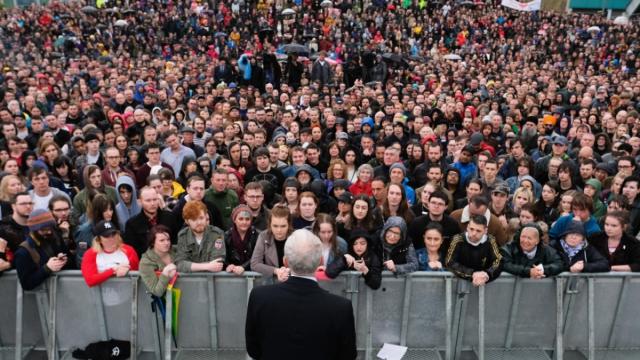
In March, progressive activists in the United Kingdom had reason to feel deeply discouraged. Nine months earlier, a majority had voted for Brexit, setting in motion plans to pull the U.K. out of the European Union. Then Conservative Prime Minister Theresa May decided to call a “snap election” with the goal of consolidating Tory power in Parliament in the face of weak opposition. The Labour Party, led by progressive Jeremy Corbyn, was polling at a miserable 24 percent and facing the possibility of further marginalization.
But on June 8, Corbyn and the Labour Party experienced a stunning reversal of fortune, almost winning the national election called in to vanquish them. And as of mid-July, Labour is eight percentage points ahead of the Conservatives.
One key force in this change was a grassroots network called Momentum, formed in 2015 to build participation and engagement in the Labour Party. This election, Momentum mobilized 23,000 members and 150 local chapters through on-the-ground campaigning and social media. Think Our Revolution and MoveOn.org with a powerful electoral field operation.
“The results were beautiful,” said Deborah Waters, a Momentum co-founder and volunteer. “I heard it described as ‘the bitterest of victories for the Conservatives and the sweetest of defeats for Labour.’ The winners didn’t really win and the losers didn’t really lose.”
How did this reversal happen? And what can those of us deep in this Trump presidency learn from it? What follows are eight lessons from Momentum and Labour’s remarkable campaign.
1. Mobilize the Base, Both Newcomers and Longtime Supporters
What Momentum did best, according to national organizer Emma Rees, “was [to] energize and mobilize people.” Rees said that at every training session they’ve had—33 so far—half the people who attended have been completely new to political organizing and “had never knocked on a door.”
New recruits were attracted to Momentum through creative social media outreach, campaigns featuring popular artists, and one-on-one connections through personal networks.
Momentum also activated long-time Labour voters who hadn’t been enlisted to work for the campaign in decades.
Whether new to the Labour Party or long-time supporters, Momentum recruits were put to work for the campaign: Thousands of members knocked on doors, made phone calls, and performed other volunteer campaign tasks.
2. Focus on Reducing Inequality
With their slogan “For the Many, Not the Few,” Labour and Momentum put issues of income, wealth, and social inequality at the center of the campaign. According to their website, Momentum’s goals are to “redistribute wealth and power from the few to the many, put people and planet before profit and narrow corporate interests, and build a society free from all types of discrimination.”
Waters, a veteran Labour Party organizer, said this focus on inequality made their campaign much more inclusive than in past elections, when her party focused primarily on turning out Labour-identified voters. Focusing on inequality helped the campaign reach across party lines, she said. “When it comes down to it, we all have the same worries, the same fears for our families. Basically, it’s about reducing inequalities.”
3. Defense is not Enough: Put Forward a Bold Vision
When Theresa May called a snap election, some Labour leaders wanted to shift into defensive mode. “The initial response of some sections of the Labour Party was to run a ‘Stop the Tory landslide’ campaign,” said Rees. That kind of campaign would have been all about damage mitigation, she said.
Instead, Momentum ran a campaign that called for transformative change in the lives of ordinary people. And Rees believes that vision motivated people to participate in the campaign and, ultimately, to vote.
4. Keep it Local
At the heart of Momentum are 150 local, volunteer-run groups. As of June, there was a small national team of six paid organizers and another dozen full-time volunteers, supporting a field of thousands of volunteers for local chapters.
To become an official local Momentum group, there are some basic guidelines. Local groups must have gender parity, a meeting space with disabled access, a Facebook page, and a group email address. But otherwise, local groups can choose to self-organize in any way. The national team provides support but also learns from local chapters and shares ideas among the network.
Local Momentum activists knocked on tens of thousands of doors, set up information tables at markets, and worked to have real, one-on-one connections with people.
5. Get Activists into Swing Districts
Momentum identified 66 swing districts where Labour had in previous elections come within 7,000 votes of winning. Waters said that though many thought this was a waste of resources, Momentum was getting signals from their local chapters that there was tremendous grassroots energy for change.
To help organizers target swing districts, Momentum created a website where volunteers can locate nearby swing districts by entering their postal codes. The website also matched people to carpool to nearby districts so volunteers could support local chapters with more canvassers. In the end, Labour won all but four of the 66 swing districts they targeted and picked up 32 seats.
6. Run Candidates with Integrity
Corbyn exudes integrity. He’s not a jet-setter. He lives in a modest North London home, grows his own vegetables in a community garden (and makes his own jam), and takes pictures of manhole covers as a hobby.
“There is an enthusiasm factor that the polls failed to catch,” said Rees, “an intensity of support for Corbyn in large part because he is a real bloke. He is authentic. People feel they can trust him.” A 1984 picture of Corbyn being arrested for protesting apartheid in South Africa was widely circulated among younger voters, reminding people of his lifelong commitment to racial justice (similar to photos of Bernie Sanders getting arrested for civil rights demonstrations).
7. Reach Younger Voters Through Art
Like the Bernie Sanders campaign, the Corbyn campaign mobilized millions of younger voters. They filled the ranks of Momentum volunteers, working alongside traditional Labour party activists.
The movement to elect Corbyn was animated by musicians and artists. Grime musicians, a music scene that emerged in London in the early 2000s, formed Grime4Corbyn. Other music scenes, like Moshers for Corbyn, followed along. These artists promoted voter registration and engaged their audiences.
8. Use Social Media to Break Through the Echo Chamber
Momentum aimed to use social media to make politics fun. They produced hundreds of shareable graphics and videos, including one popular meme—“Bring your Dog to the Polls”—where people posted pictures of themselves with their dogs outside polling places before the election.
“Social media can sometimes just be an echo chamber, but we are trying to change and break out to reach new people,” Rees said. “Some of our videos were highly shareable. While the conservatives spent millions on dark ads accusing Corbyn of being a threat to national security, we spent like £2,000 on Facebook advertising.”
Rees said that 1 in 3 Facebook users in the U.K. watched a Momentum video during the campaign, and a staggering 7.4 million watched one particularly popular video.
The experience of Momentum is inspirational and instructive for those eager to repel Trumpism and the right-wing takeover of U.S. politics. There are obvious differences between our countries: The United States is more geographically diverse and our electoral systems—a parliamentary system in the U.K. and a Republican and Democratic party duopoly in the United States—are also quite different. And the United States faces the special challenge of highly gerrymandered districts that reduce the number of truly competitive races.
But one common denominator is the power of grassroots organizing and the importance of face-to-face engagement. There is a realignment happening in U.S. politics, the result of growing inequality and polarization, and this creates both dangerous volatility and progressive possibilities. We need to build on the existing infrastructure of grassroots movements and mobilizing groups. Perhaps Momentum can provide some inspiration.
3 WAYS TO SHOW YOUR SUPPORT
- Log in to post comments














